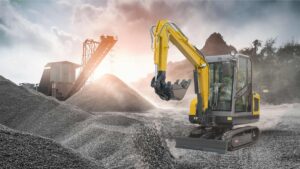Introduction
In the heart of the construction site, excavators stand as the technological behemoths that shape the landscape of progress. These marvels of engineering have evolved from rudimentary earthmovers to precision instruments, all thanks to the infusion of cutting-edge technology. In an era marked by innovation, modern excavators are equipped with advanced systems, sensors, and controls that transform their capabilities. This comprehensive exploration delves into the transformative power of technology on excavator performance, unveiling the intricate mechanisms and features that have redefined their role in construction and beyond.
Table of Contents
- Tech-Powered Metamorphosis: The Evolution of Excavators
- Precision and Productivity: How GPS and Machine Control Enhance Accuracy
- Hydraulic Advancements: From Power to Finesse in Operation
- Smart Systems and Telematics: Data-Driven Decision Making on the Field
- Human-Machine Interface: Intuitive Controls for Operator Efficiency
- Advanced Attachments: Tailoring Excavators for Specific Tasks
- Electric and Hybrid Propulsion: Redefining Efficiency and Sustainability
- Automation and Robotics: Excavators of the Future, Today
- Safety Innovations: Protecting Operators and Job Sites
- Fuel Efficiency and Emissions Reduction: Technology’s Environmental Impact
- Real-time Monitoring and Maintenance: Preventing Downtime Through Insights
- Integration with BIM and Digital Twins: Streamlining Project Management
- Comparative Analysis: Evaluating Tech Integration Across Excavator Brands
- Operator Training and Tech Utilization: Maximizing the Benefits
- ROI Calculation for Tech-Driven Excavators: Balancing Costs and Gains
- Future Trends: Anticipating Further Technological Transformations
- FAQ
1. Tech-Powered Metamorphosis: The Evolution of Excavators
Modern excavators have undergone a remarkable transformation through the infusion of technology. From rudimentary digging machines, they have evolved into precision instruments of construction.
2. Precision and Productivity: How GPS and Machine Control Enhance Accuracy
Global Positioning System (GPS) and machine control technologies have revolutionized excavator precision. Real-time data and guidance systems ensure accuracy in digging and grading tasks.
3. Hydraulic Advancements: From Power to Finesse in Operation
Hydraulic systems have evolved to provide precise control over excavator movements. Variable displacement pumps and advanced hydraulics enhance efficiency and minimize wastage.
4. Smart Systems and Telematics: Data-Driven Decision Making on the Field
Smart systems and telematics gather real-time data from excavators, enabling remote monitoring, predictive maintenance, and informed decision-making for project managers.
5. Human-Machine Interface: Intuitive Controls for Operator Efficiency
Intuitive interfaces and ergonomic controls enhance operator efficiency. Touchscreens, joysticks, and customizable settings optimize excavator operation and reduce operator fatigue.
6. Advanced Attachments: Tailoring Excavators for Specific Tasks
Technology extends to attachments, with quick couplers, hydraulic systems, and sensors that optimize attachment performance. Excavators can easily switch between tasks.
7. Electric and Hybrid Propulsion: Redefining Efficiency and Sustainability
Electric and hybrid excavators offer reduced emissions, quieter operation, and energy efficiency. Batteries and electric powertrains contribute to a more sustainable construction landscape.
8. Automation and Robotics: Excavators of the Future, Today
Automation and robotics transform excavators into autonomous workers. From digging trenches to grading, these excavators operate with precision, reducing human intervention.
9. Safety Innovations: Protecting Operators and Job Sites
Technological advancements enhance excavator safety with features like collision avoidance systems, 360-degree cameras, and sensors that prevent accidents on the job site.
10. Fuel Efficiency and Emissions Reduction: Technology’s Environmental Impact
Technology-driven innovations optimize fuel efficiency and reduce emissions. Advanced engine management, regenerative systems, and hybrid solutions contribute to environmental goals.
11. Real-time Monitoring and Maintenance: Preventing Downtime Through Insights
Real-time monitoring systems provide insights into excavator health and performance. Predictive maintenance ensures timely repairs, minimizing downtime and maximizing uptime.
12. Integration with BIM and Digital Twins: Streamlining Project Management
Excavators seamlessly integrate with Building Information Modeling (BIM) and digital twin technologies. This integration enhances project planning, coordination, and execution.
13. Comparative Analysis: Evaluating Tech Integration Across Excavator Brands
Comparing technology integration across excavator brands involves assessing features, compatibility, and user experience to identify brands that excel in tech-driven solutions.
14. Operator Training and Tech Utilization: Maximizing the Benefits
Operator training is crucial for unlocking the full potential of technology. Proficient operators can harness the capabilities of tech-integrated excavators for optimal results.
15. ROI Calculation for Tech-Driven Excavators: Balancing Costs and Gains
Calculating return on investment for tech-driven excavators involves evaluating efficiency gains, reduced operational costs, increased project capacity, and improved safety.
16. Future Trends: Anticipating Further Technological Transformations
Excavator technology continues to evolve. Anticipating trends like AI integration, enhanced connectivity, and remote operation offers a glimpse into the future of construction.
17. FAQ
Q1: Are tech-driven excavators more expensive to purchase and maintain?
Tech-driven excavators may have higher initial costs due to advanced features, but they often result in long-term savings through increased efficiency and reduced maintenance.
Q2: How do tech-integrated excavators impact operator training?
Tech-integrated excavators require operators to receive training on the specific technology features. Training ensures operators can leverage technology for improved performance.
Q3: Can older excavator models be retrofitted with new technology?
Yes, older excavator models can often be retrofitted with new technology to some extent.



